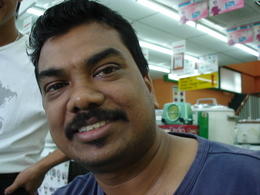Of generals and military coups
On October 12, 1999, the Pakistani prime minister Nawaz Sharif tried to sack a powerful military general while the general was out of the country. When the general attempted to return to his homeland, the premier ordered the plane to be barred from landing in Karachi.
The general however had the backing of his fellow generals and soldiers. On his word, they took over the airport and allowed the plane to land. Soon after that, the general - Pervez Musharraf - took control of the country. He arrested Nawaz, exiled him and prevented almost all other political leaders from entering Pakistan. And after more than a year of military control Musharraf declared himself as the president of the country.
He had always maintained that he was only in power until full democracy was restored in Pakistan. Now he has become a close ally of the US in the fight against terrorism and in the TIME 100 Poll 2006 of "The People Who Shape Our World" he is ranked at number 14.
He has gained a stronghold of power and looks set to remain as the president until Oct 2007. In all, his temporary control of power can last up to eight years and we still don’t know if he will step down in Oct 2007.
Now fast forward to Sept 19, 2006, Bangkok, when another general - Sonti Boonyaratrin - cooly overtook the Thai government while Prime Minister Thaksin Shinawatra was in New York to attend the United Nations General Assembly.
The general has promised to return "power to the people" as soon as possible. In the meantime Thaksin is still in New York, not knowing what will happen to him if he were to return home.
What happened in Pakistan in 1999 has happened in Thailand today - both were bloodless coup d'etat, both generals suspended the parliament and constitution, and both of them created a special committee headed by the army to rule the country.
These are not just confined to Pakistan and Thailand. In fact all military-backed coups have a similar trait. And they have one more common thing - all military leaders tend to see themselves as the saviour of the country, become politicians, stand in elections and finally do whatever is possible to remain in power. In short, they just become the person they forcible disposed!
My point is this: political changes must only take place through proper political processes. No one, especially the army, should be allowed to topple an elected government in the name of democracy through undemocratic means.
A government elected by the people will be toppled by the same people if it fails to do the needful for them. The military should be a silent observer of whatever political turmoil in the country. Politicians know what to do and how to do to solve their problems. And if they can’t, the voters can and in most cases, will.
As such I totally disagree with Gen Sonti’s remark that he headed the coup because Thaksin's policies had created serious rifts that needed to be healed.
And I agree with Malaysian Opposition Leader Lim Kit Siang who said that democratic elections, and not coups, must be the way to change governments.
He added:
"Decades of Thai progress in terms of democracy, respect for human rights and the rule of law had been undone by the military coup."
Anyway, we await for further development on the restoration of democracy and rule of law in our northern neighbour.


0 Comments:
Post a Comment
<< Home